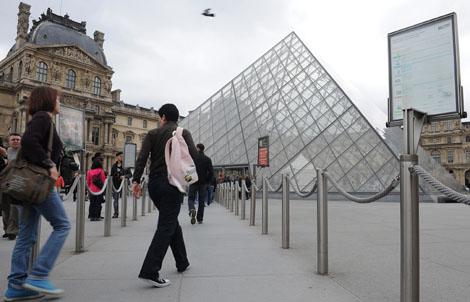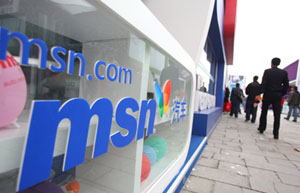Companies
Online tour companies see growing market
By Shen Jingting and Chen Limin (China Daily)
Updated: 2010-11-12 15:58
 |
Large Medium Small |
|
 |
|
Tourists enter the Louvre museum in Paris. With a rising middle class and stronger currency exchange, Chinese tourists have been flocking to Europe in increasing numbers, providing a boost to the continent's tourism industry. [Bloomberg] |
Internet-savvy youth provide growing market for online tour companies
BEIJING - To catch a glimpse of the mystical northern lights, ride scooters across snowy forests, or catch a 15-kg king crab from the cold sea, is a privilege that is being enjoyed by more and more wealthy Chinese.
The "Chasing Northern Lights" voyage in Norway is among the various European travel packages promoted by Chinese travel websites as well-off Chinese people's enthusiasm for traveling to Europe rises.
The nation's major online travel booking companies, such as Nasdaq-listed Ctrip.com and Elong.com, have seen their revenue from European travel products at least double this year, compared with the same period in 2009.
Young people's affinity with the Internet has helped to boost business for online travel agencies.
"About 30 percent of visitors to Europe on tours organized by our company are people born after 1980. They now have a stable income and gradually become a main force for online travel booking," said Pan Bo, travel business director for North China at Ctrip.com.
The China Internet Network Information Center, which has been tracking Internet traffic in China since 1997, said in July that 36.1 million people booked travel products online in the first half of 2010. Although the penetration rate was just about 8 percent, the growth was 19 percent over the same period of last year.
Jiang Weiyong, a manager with Aoyou.com, an online booking website under China Youth Travel Service Co Ltd, said the penetration rate in the United States is 70 percent and 50 percent in Europe. Based on the growth of the Chinese travel market, there is huge potential for the online segment.
According to Shanghai-based consulting firm iResearch, the online travel booking market reached 1.72 billion yuan ($260 million) in the third quarter, up 66 percent over the same period last year.
Ctrip took more than half of the market share, with Elong a distant second at 8.6 percent.
When Chinese travelers look beyond domestic travel hot spots and neighboring markets such as Thailand or Singapore, they also use online booking services more, Ctrip's Zhang said.
He said the top three destinations are France, Switzerland and Italy. However, countries such as Germany and Greece, which were less popular in the past, have also performed well in China's overseas travel market in the first nine months of this year, he said.
For example, almost 400 people from Beijing enjoyed a summer holiday in Greece this year, compared to 100 last year, according to statistics from Ctrip.com.
Ctrip.com reaped a net profit of $48 million in the third quarter, up 70 percent year-on-year. The increase mainly resulted from the good performance in the travel sector, in which European travel products were hotly purchased.
In January, Ctrip.com launched a product called "500,000 yuan to travel the world", and the 30 online vacancies were sold out in just nine minutes, Zhang said.
The reasons why Chinese people suddenly favor European trips are yuan appreciation, which lowers the cost of traveling to Europe, and the increased incomes of Chinese people, according to a woman surnamed Zhu at tourism department of Elong, in which Expedia is the largest shareholder.
"On average, the travel fee is about 15,000 yuan a person. This is affordable to more people now," Zhu told China Daily.
She said Chinese travelers to Europe often have an annual salary of more than 150,000 yuan and are usually self-employed, white-collar employees, or high-level managers.
Zhu added that, during these trips, most of these tourists will also spend between 30,000 yuan and 50,000 yuan on shopping.
Travel agencies have launched specially tailored European travel products to better serve China's super-rich, who are usually over 40.
"We have in-depth travel products for high-end Chinese customers," said Liu Jie, China office general manger of Norwegian cruise liner company Hurtigruten Ltd.
He said his company organizes trips to places such as the Antarctic, or the Norwegian fjords.
"In the past two years, more than 90 percent of our Chinese customers have visited the Antarctic or the Arctic," Liu said.




